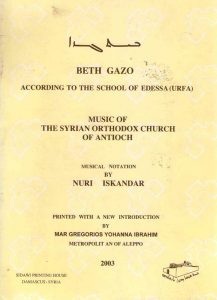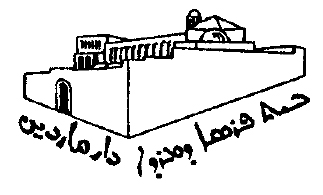![]() Nouri Iskandar
Nouri Iskandar
![]() Mardine
Mardine
![]() Syria
Syria
![]() Essay
Essay
![]() Syriac language
Syriac language
Various attempts were made to study Syriac music. However, there is no agreement about a serious study examining the roots of Syriac music and demonstrating its origins, how it was adopted and what were the criteria upon which it entered the Syriac Church. There were no answers on how it developed, and why there were variations of the melodies from city to the village, from the field to the mountain, and from one monastery to another. All publications are mere collections and recollections of already published materials that are not based on reliable sources, especially when it comes to the pre-Christian history.
The art of music constitutes a significant part of the heritage of peoples and it was not possible throughout history for nations and tribes to live without music. Music flourished in Mesopotamia, the Levant and along the borders of the Babylonian and Assyrian empires as well as all the Aramaic kingdoms spread in the region.
Nouri Iskandar was born in Deir Ezzor-Syria in 1938. He moved with his family to Aleppo where music became his obsession. He began to play trumpet and violin in the Syriac Orthodox scouting troupe in Aleppo. After that, he travelled to Cairo and obtained a BA from the Higher Institute for Music Education in 1964.
Then he returned to Aleppo to devote himself to his constant love and daily obsession to the Levantine music and its heritage and history. He taught music until 1989 in Aleppo preparatory schools and the Teachers Institute operated by the ministry of education. He held the position of the Director of the Arab Institute in Aleppo between 1994 and 2003.
Iskandar is considered as one of the Syrian researchers and composers the most interested in documenting the ancient Syrian music, particularly, the ecclesiastical and civil Syriac, which belongs to the School of Edessa and the School of Deir al-Zafaran. He transformed the Syriac music from its oral heritage format, which was exposed to loss, to the written format collected and presented in two books in the more modern musical system.
الكتاب:
بيث كازو - الموسيقى السريانية الرهاوية
جرت محاولات مختلفة لدراسة الموسيقى السريانية باللغات كافة. ولكننا لم نتفق على دراسة جدية تعمقت في جذور الموسيقى السريانية فبرهنت من أين جاءت وكيف قُبلت وعلى أي أساس دخلت إلى الكنيسة السريانية وكيف تطورت، ثم لماذا حصل تبدلات في الألحان من المدينة إلى القرية، ومن السهل إلى الجبل، ومن دير إلى آخر. وكل ما صدر حتى الآن هو عبارة عن اجترار معلومات سبق وقيلت هنا وهناك ولكنها غير مبنية على مصادر يركن إليها ويعتمد عليها، خاصة ما يتعلق بتاريخها ما قبل المسيحية. فعندما نعيد جذور ألحاننا إلى حضارات سومر وآكاد وبابل وآشور وآرام، هذا يحتاج إلى تعمق في علم الأركيولوجيا والتاريخ القديم وليس بالأمر السهل، لأن تفاعل هذه الحضارات مع حضارات أخرى نمت وعاشت في المنطقة تشكل خصوصية للموسيقى في كل المنطقة. لهذا لا نريد ان ندخل في تفاصيل تجزر انتماء موسيقانا إلى حضارات سبقت المسيحية، ولكننا في الوقت ذاته نشير بوضوح أننا لا نستبعد أن تكون بعض ألحاننا السريانية المستعملة اليوم من قبل الإكليروس والشمامسة وجوقات الترتيل لها علاقة بألحان المنطقة في عصر ما قبل المسيحية. فلا يمكن أن تعيش أمم هذا الأرض وقبائلها دون أن تمارس الموسيقى، لأن الموسيقى في عرف كل الأمم هي فن من فنون الآداب بل هي جزء مهم من تراثات الشعوب، وقد ازدهرت في بقاع الرافدين وبلاد الشام وحدود الامبراطوريتين البابلية والآشورية وفي كل الممالك الآرامية المنتشرة في المنطقة.
تأليف وتنويط نوري اسكندر
من مواليد دير الزور – سورية في عام 1938. هاجر مع عائلته إلى حلب وفيها كانت الموسيقى هاجسه الجميل. درس الموسيقى في صغره على يد الموسيقي الروسي ميشيل بوزيرنكو. بداياته كانت مع الفرقة الكشفية السريانية الأرثوذكسية في حلب عازف ترومبيت ودرس آلة الكمان لمدة سنة واحدة. ومن ثم توجه إلى القاهرة وحصل هناك على ليسانس من المعهد العالي للتربية الموسيقية في عام 1964م.
بعدها عاد إسكندر لحلب ليتفرغ لعشقه الدائم وهاجسه اليومي؛ الموسيقى المشرقية بتراثها وتاريخها وعمقها الحضاري. قام بتدريس الموسيقى في مدارس حلب من قبل وزارة التربية والتعليم في المدارس الإعدادية وبالإضافة إلى دار المعلمين حتى عام 1989م. شغل منصب مدير المعهد العربي في حلب بين عام 1994 ولغاية 2003.
يعتبر إسكندر من أكثر الباحثين والمؤلفين الموسيقيين السوريين اهتماماً بتوثيق الموسيقى السورية القديمة ولا سيما السريانية الكنسية منها والمدنية، والتي تعود لكل من مدرسة الرها ومدرسة دير الزعفران، حيث حوّلها من تراث شفهي معرض للضياع إلى مدوّنات جمعها في كتابين وفق نظام الكتابة الموسيقية الحديثة “التنويط".





